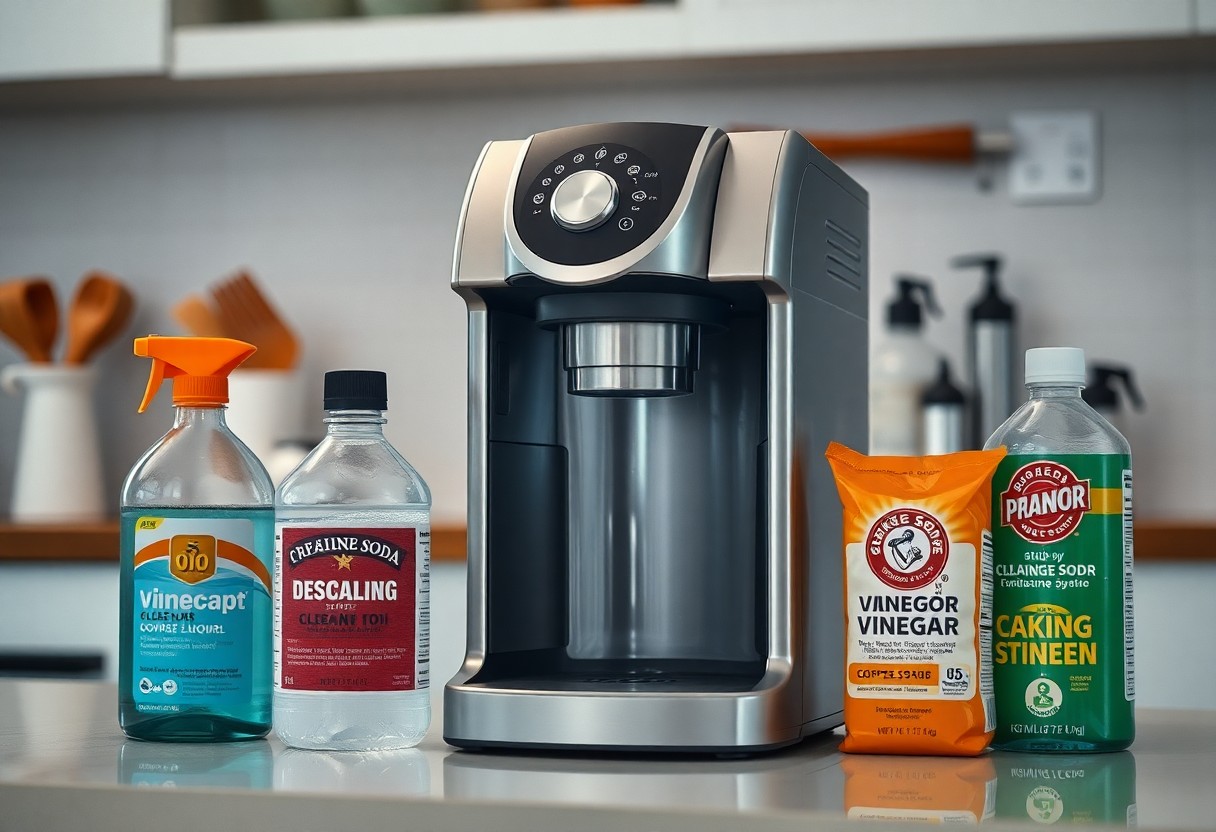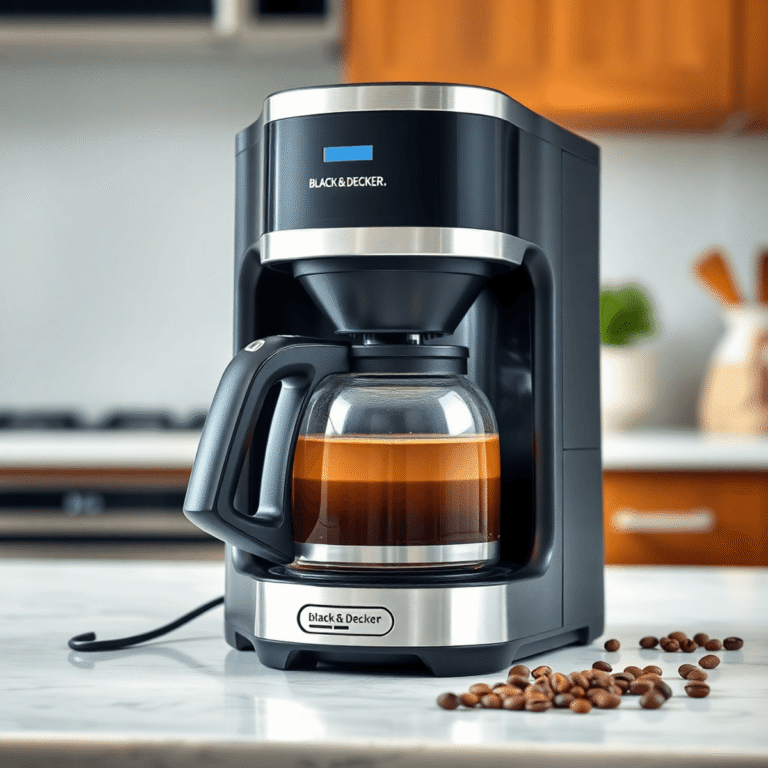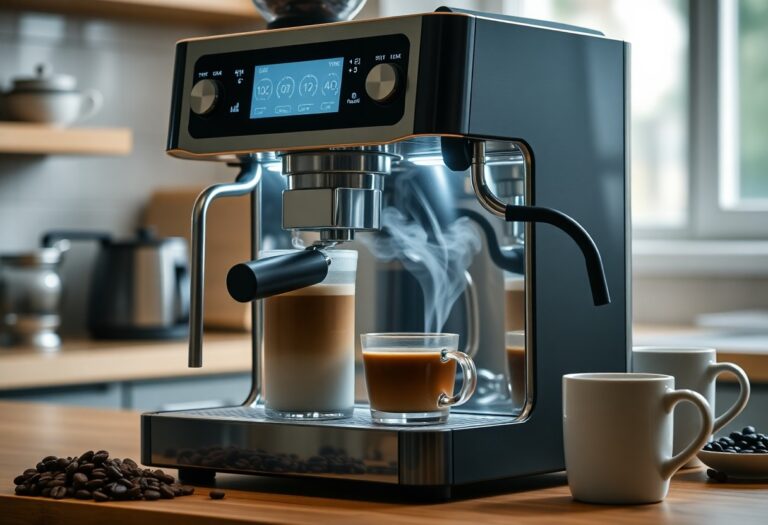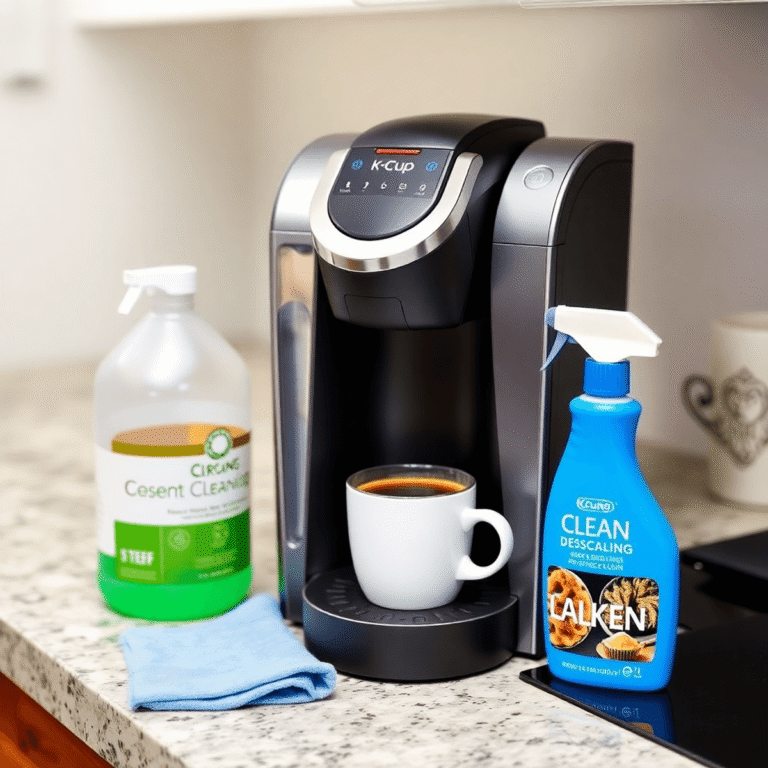What Can I Use to Clean a Coffee Machine – Cleaning Solutions
Coffee machines can accumulate residue and build-up, affecting not just the taste of your brew but also the longevity of your appliance. To maintain optimal performance, you must regularly clean your machine using safe and effective solutions. Common cleaning agents include vinegar for descaling, baking soda for odor removal, and specialized commercial cleaners tailored for your coffee maker. By knowing the right products to use, you’ll enhance your coffee experience and protect your investment.
Key Takeaways:
- White vinegar is an effective and natural cleaning solution for descaling coffee machines.
- Commercial coffee machine cleaners are available that are specifically designed for effective cleaning and maintenance.
- Baking soda can be used in combination with water to tackle odors and stains in coffee makers.
- Always refer to your coffee machine’s user manual for specific cleaning instructions and recommended products.
- Regular cleaning and descaling can extend the lifespan of your coffee machine and improve the taste of brewed coffee.
Decoding Coffee Machine Dilemmas: When Cleanliness Matters
Keeping your coffee machine clean is important for both the longevity of the appliance and the quality of your brew. Accumulated residue can easily sour the taste of your favorite morning pick-me-up, leading you to question if your coffee machine still has the same loveable charm. Understanding the signs that maintenance is overdue will help you savor every cup and appreciate the different layers of flavor your coffee has to offer.
The Impact of Coffee Residue on Flavor
Over time, coffee residues can build up in your machine, imparting a bitter, stale taste to your brews. When grease and oils from coffee grounds cling to the brewing chamber and other components, they affect the extraction process, leading to a less aromatic cup. In turn, your once-delicious coffee can turn into a subpar experience, stealing away the rich nuances you cherish. Regular cleaning will ensure optimal flavor and freshness in every sip.
Signs Your Machine Needs a Deep Clean
Look out for multiple indicators that your coffee machine is crying out for attention. If you notice a buildup of coffee oils, an off-putting odor, or a sluggish brewing process, these are clear signs that it’s time to give your machine some love. Additionally, strange tastes and residual grounds in your cup suggest the inner workings may be needing a thorough rinse. Failing to address these symptoms can ultimately compromise both your coffee’s flavor and your machine’s efficiency.
Pay special attention to brewing inconsistencies, such as weak or overly bitter coffee, which signal that your machine might be suiting itself with coffee buildup. If your coffee tastes different than it used to, or if you experience longer brewing times, these can also point to a need for deep cleaning. Ignoring these signs not only affects taste but can lead to more severe issues down the line, including potential damage to your machine. A little upkeep can save you from expensive repairs and the disappointment of bad coffee.
Everyday Ingredients: Nature’s Cleaning Agents
Harnessing common household ingredients can provide effective and eco-friendly solutions for cleaning your coffee machine. These versatile agents not only tackle grime and buildup but are also gentle on your appliance. With no need for harsh chemicals, opting for natural cleaners ensures that your coffee remains pure and untainted by artificial substances. By turning to everyday items, you can maintain your coffee machine’s performance while supporting a healthier home environment.
The Power of Vinegar: A Versatile Solution
Vinegar is often hailed as one of the most effective natural cleaning solutions available, particularly for coffee machines. Its high acidity helps dissolve mineral deposits and scale, making it an ideal choice for descaling. Simply run a mixture of equal parts water and white vinegar through your machine to keep it in top shape, ensuring that each cup of coffee tastes as fresh as the last.
Baking Soda’s Abrasive Benefits
Baking soda proves to be a low-cost and effective cleaning alternative, particularly for stuck-on residue and tough stains. Its fine, gritty texture allows you to gently scrub away deposits in your coffee machine, leaving it sparkling clean without scratching surfaces. Combine it with warm water to create a paste that can tackle even the most stubborn buildup, ensuring your appliance stays efficient and clean.
When using baking soda, consider making a paste by mixing it with a little warm water. Apply this paste to the coffee pot and any removable parts to scrub away grime effectively. The gentle abrasiveness of baking soda not only cleans but also deodorizes, eliminating lingering coffee odors. This method is particularly beneficial for older machines, which may accumulate more residue over time. You can trust baking soda to restore the shine and functionality of your coffee maker, enhancing your brewing experience.
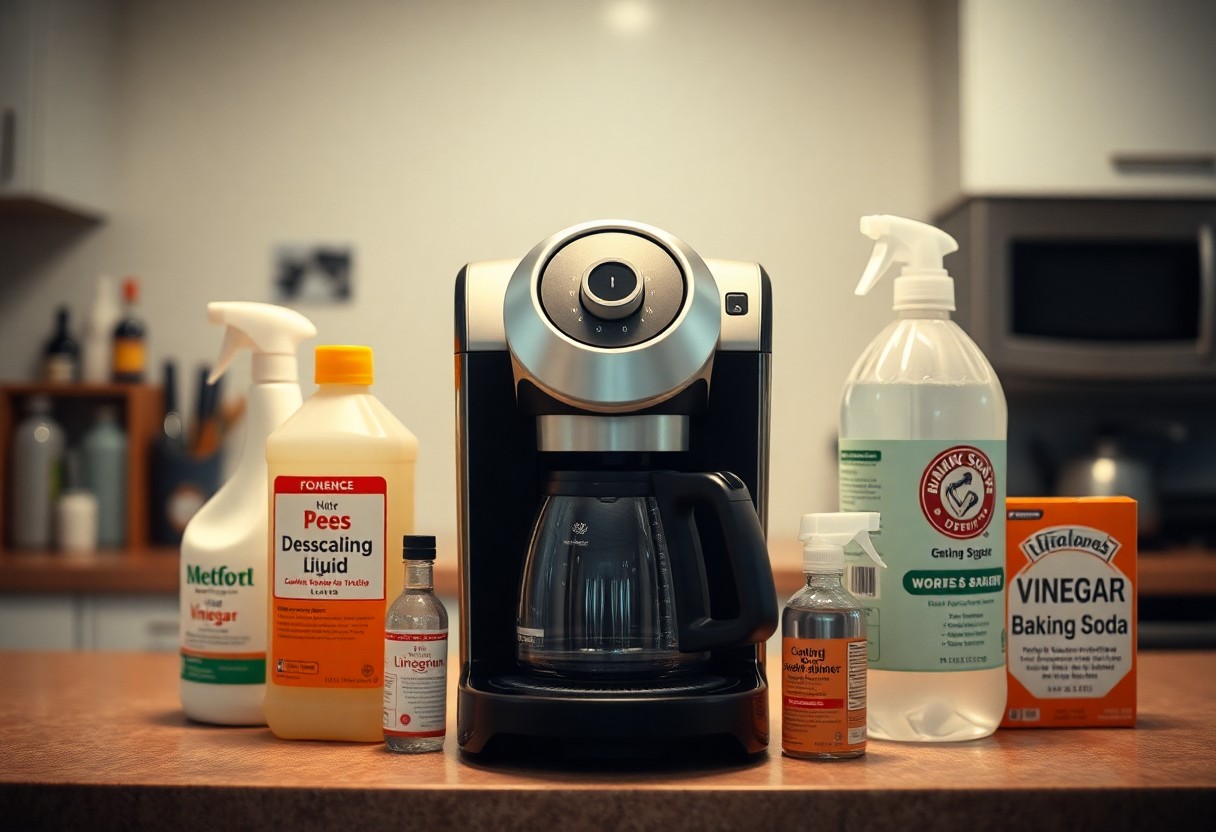
Store-Bought Solutions: Convenience Meets Efficacy
Store-bought cleaning solutions provide an effective and hassle-free way to keep your coffee machine in prime condition. These products are specifically designed to tackle coffee oils, mineral build-up, and other residues that can compromise the flavor and quality of your brew. With a variety of options available, you can choose from liquid cleaners, pods, or powders, each offering unique benefits and user-friendly applications.
Evaluating Popular Coffee Machine Cleaners
When opting for a coffee machine cleaner, consider popular brands like Descale, Urnex, and Keurig’s own range. Check for effectiveness in removing calcium deposits, as well as user reviews to gauge reliability. Product packaging often includes clear instructions, which ensure you get the best results with minimal effort. Many of these cleaners are safe for different types of coffee machines, but familiarity with product compatibility is key.
Eco-Friendly Options: Sustainable Cleaners That Work
Eco-friendly cleaning solutions have gained popularity due to their ability to effectively clean without chemicals harmful to the environment. Options like vinegar, baking soda, or specialized brands that emphasize natural ingredients are great alternatives. You can safely descale and deodorize your coffee machine while being environmentally conscious.
Choosing eco-friendly cleaners not only benefits your health by avoiding harsh chemicals but also protects the environment. For instance, using vinegar for descaling is both effective and sustainable; its acidic properties quickly break down limescale. Brands like “Cafe Mythos” and “Green Coffee” offer certified organic alternatives that match the efficacy of traditional cleaners while adhering to eco-friendly practices. Always check for certifications and ingredients to ensure you’re making a positive choice for both your appliance and the planet.
Step-by-Step Cleaning Techniques: A Practical Guide
Following a systematic approach makes the cleaning of your coffee machine straightforward and effective. Start by disassembling the machine and emptying all the components that require cleaning. Use the right cleaning solution, either store-bought or homemade, based on the machine’s material. Rinse thoroughly and reassemble once everything is dry. Finally, run water through the machine to ensure no cleaning residue remains. Clean parts regularly and inspect for any signs of wear or damage.
Routine Maintenance: Daily and Weekly Tips
Incorporate simple maintenance practices to keep your coffee machine in top shape. Daily tasks include removing used coffee grounds and rinsing removable parts with warm water. Weekly, you should use a dedicated cleaning solution to descale and deep clean components like the water reservoir and brew basket. Following these rituals not only prolongs your coffee machine’s life but also ensures you enjoy great-tasting coffee every time. The maintenance consistently yields optimum performance and satisfaction.
Deep Cleaning: Monthly Rituals for Peak Performance
Set aside time each month for a thorough deep cleaning of your coffee machine. Begin by disassembling all parts that can be detached and wash them in warm, soapy water. For areas with built-up residue, consider a mixture of equal parts vinegar and water for soaking. Don’t forget to clean the exterior as well; a simple wipe with a damp cloth will do wonders. A meticulous monthly cleaning not only enhances the flavor of your coffee but also eliminates any lingering odors or deposits that can affect your brew.
Regular deep cleaning ensures that any coffee oils and mineral buildup do not compromise the machine’s functionality. By tackling this maintenance monthly, you significantly enhance the lifespan of the machine, improve coffee taste, and create a healthier brewing environment. With just a bit of extra effort, you’re guaranteed optimal performance and a richer coffee experience.

Common Misconceptions: Debunking Myths About Coffee Machine Care
Many myths surround coffee machine maintenance that can lead to ineffective cleaning practices. For instance, some people believe that vinegar is a one-size-fits-all solution, underestimating the potential damage it can cause to certain machine components. Others think that frequent flushing with water is enough to keep machines pristine, while neglecting the buildup of coffee oils and minerals that need special attention. Understanding these misconceptions empowers you to adopt better cleaning habits and ensure your coffee machine stays in top condition.
The Truth About Disinfectants and Food Safety
Using disinfectants on your coffee machine might seem wise for maintaining cleanliness, but not all disinfectants are safe for food equipment. Many contain toxic substances that can leave harmful residues, compromising your coffee’s taste and safety. Focus instead on food-safe cleaning agents that effectively sanitize without jeopardizing your health. Always ensure that any cleaning product you use is designed specifically for food-contact surfaces to avoid contamination.
Self-cleaning features on coffee machines are often seen as a magic fix, but they’re not foolproof. While these functions do help reduce buildup, they typically don’t address all the nooks and crannies where residue may collect. Relying solely on this feature may allow minerals and oils to accumulate over time, leading to performance issues and a stale taste in your brews. Manual cleaning should still be part of your routine to ensure comprehensive care of your coffee machine.
In fact, self-cleaning cycles may only remove superficial dirt, leaving stubborn coffee oils and limescale untouched. To keep your coffee machine fully functional, supplement the self-cleaning feature with periodic deep cleans using appropriate solutions. This combination helps maintain flavor integrity and prolongs the lifespan of your machine, allowing you to enjoy consistently great coffee.
Final Words
Hence, when it comes to cleaning your coffee machine, using solutions like vinegar, baking soda, or specialized coffee maker cleaners will help maintain its performance and flavor. You can also find valuable tips from other coffee enthusiasts on the Best way to clean coffee maker? forum. Keep your equipment in top shape, and your coffee experience will always be enjoyable.
FAQ
Q: What is the best natural solution to clean my coffee machine?
A: One of the best natural solutions for cleaning a coffee machine is a mixture of vinegar and water. To use this method, mix equal parts of white vinegar and water, then run this solution through your coffee maker the same way you would brew coffee. Afterward, run two or three cycles of plain water to rinse out any vinegar residue. This helps remove mineral buildup and odors without harsh chemicals.
Q: Can I use baking soda to clean my coffee machine?
A: Yes, baking soda is a great cleaning agent for coffee machines! To use it, create a paste with a little water and apply it to the carafe and other removable parts. You can also add a few tablespoons of baking soda into the water reservoir and run a brewing cycle. It helps eliminate tough stains and neutralizes odors. Be sure to run several cycles with plain water afterward to ensure all baking soda is washed away.
Q: How often should I clean my coffee machine?
A: It is recommended to clean your coffee machine every 1 to 3 months, depending on how often you use it. If you use your coffee maker daily, a monthly deep clean is advisable. For less frequent use, every three months is sufficient. Regular cleaning helps maintain optimal taste and extends the life of your coffee machine.
Q: Are there commercial cleaning solutions that work better than home remedies?
A: Yes, there are specialized commercial coffee machine cleaning solutions available, such as descaling agents and cleaning tablets that are designed to break down mineral buildup and coffee oils. These products are often more effective and easier to use than homemade solutions, especially for heavy-duty cleaning. Always follow the manufacturer’s instructions for the best results.
Q: Can I use bleach or ammonia to clean my coffee machine?
A: It is not advisable to use bleach or ammonia to clean your coffee machine, as these harsh chemicals can leave harmful residues that may contaminate your coffee and highly affect its flavor. Furthermore, they can damage the components of the coffee maker over time. Stick to gentle cleaning solutions like vinegar, baking soda, or specialized coffee machine cleaners for safe and effective cleaning.

